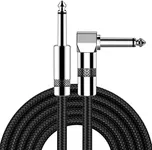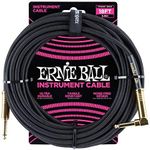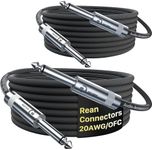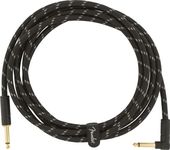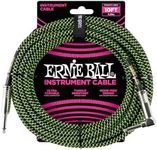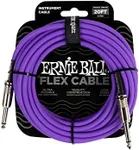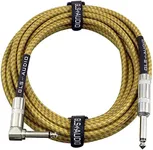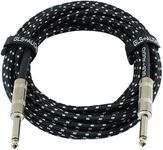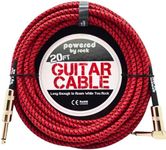Buying Guide for the Best Guitar Cables
Choosing the right guitar cable is crucial for ensuring the best sound quality and performance from your instrument. A good cable can make a significant difference in your overall playing experience, reducing noise and maintaining the integrity of your guitar's tone. When selecting a guitar cable, it's important to consider several key specifications to find the best fit for your needs.LengthThe length of a guitar cable is important because it affects both convenience and sound quality. Shorter cables (under 10 feet) are ideal for home practice or studio use, as they minimize signal loss and noise. Medium-length cables (10-20 feet) offer a balance between mobility and sound quality, making them suitable for small gigs or rehearsals. Longer cables (over 20 feet) provide maximum freedom of movement on stage but can introduce more noise and signal degradation. Choose a length based on your typical playing environment and how much mobility you need.
Connector TypeGuitar cables typically come with either straight or right-angle connectors. Straight connectors are versatile and work well in most situations, especially when plugging into pedals or amps with top-mounted jacks. Right-angle connectors are useful for saving space and reducing strain on the cable, particularly when connecting to side-mounted jacks on guitars or pedals. Consider your setup and how the cable will be used to determine which connector type is best for you.
ShieldingShielding is a critical feature that protects the cable from electromagnetic interference (EMI) and radio frequency interference (RFI), which can cause unwanted noise. There are three main types of shielding: braided, spiral, and foil. Braided shielding offers the best protection and durability but can be more expensive. Spiral shielding provides good flexibility and adequate protection for most uses. Foil shielding is the least effective but is often used in combination with other types for added protection. Choose a cable with good shielding to ensure a clean, noise-free signal.
Cable MaterialThe material of the cable itself can affect its durability and sound quality. Oxygen-free copper (OFC) is a common choice for high-quality cables because it offers excellent conductivity and resistance to corrosion. Some cables also feature additional materials like gold-plated connectors for improved signal transfer. Consider cables made from high-quality materials to ensure longevity and optimal performance.
CapacitanceCapacitance refers to the cable's ability to store an electrical charge, which can affect the tone of your guitar. Lower capacitance cables preserve more of the high frequencies, resulting in a brighter, clearer sound. Higher capacitance cables can roll off some of the high end, producing a warmer tone. If you prefer a bright, articulate sound, look for cables with low capacitance. If you like a warmer, mellower tone, a higher capacitance cable might be more suitable.
DurabilityDurability is an important factor, especially if you plan to use the cable frequently or in demanding environments. Look for cables with strong, flexible jackets and reinforced connectors to withstand wear and tear. Some cables also feature additional strain relief at the connectors to prevent damage from bending or pulling. Choose a durable cable to ensure it can handle the rigors of regular use without failing.
